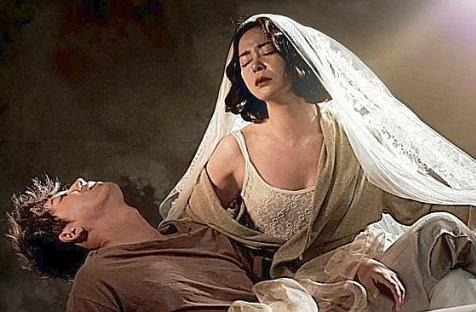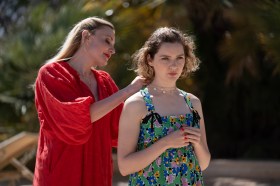A cinematic life lived inside the lines is not for Kim Ki-duk; nor, as gleaned from the wealth of complicated content he has created during his two decades in film, does it apply to his characters. The South Korean writer/director has continually thrived in the social margins, even when his efforts have strayed into more contemplative territory, the blackness of 2000’s controversial The Isle, 2006’s Time, and 2011’s self portrait Arirang more typical of his fare than the quiet calm of 2003’s Spring, Summer, Fall, Winter… and Spring.
With Pietà, the filmmaker retains the grit and gloom for which he has become known – emotionally, as well as stylistically. Although his frames sparkle with the polish of impeccable technical construction, the haze of complexity is always present. Similarly, the seeds of fragmentation sprout in the fractured personal relationships that take his titular reference – the sorrowful representation of the Virgin Mary cradling the corpse of Jesus, as depicted in sculpture by Michelangelo and in paint by Luis de Morales – to its extremes.
A mother and son comprise the centre of Ki-duk’s twisted tale, in a rendering both embracing and subverting the portrait of maternal devotion that might be inferred. The latter, Kang-do (Lee Jung-jin, Wonderful Radio), is marked by his mercilessness as a loan shark’s enforcer in downtown Seoul, his dutiful brutality matched by his domestic bleakness. The former, unexpected stranger Min-sun (Cho Min-soo, in her only film role to date), arrives unexpectedly to interrupt his routine, offering acts of kindness from the shadows before revealing her identity.
Their reunion is uncomfortable, ugly, awkward, and inappropriate, but also – in its darkest, most unexpected moments – tender and transformative. The details that envelope them, concerned with the costs and consequences of choices made for both selfish and selfless reasons, crafted from the sins of the past, present and future, and coloured by a bond that defies description in its testing of boundaries, provide further fuel for the fire that not-so-silently rages within the ferocious but finessed feature.
Troubled, tortured, terse and tense, Pietà can be seen to share much with the work of the director’s countrymen: Bong Joon-ho’s tragic thematic core, Park Chan-wook’s unrelenting cycle of revenge, redemption and rebirth, and Kim Jee-woon’s visceral handling of violence all echo throughout the operatic feature. And yet, the riveting film always remains the culmination of Ki-duk’s distinctive 18-movie oeuvre, its horrors and hopes intertwining in the auteur’s inimitable fashion to haunt with the depth of its cruelty and the scope of its unlikely affection.
Though many of its multifacted elements try, it is in Pietà’s characterisations and corresponding performances that it perhaps best perfects the filmmaker’s career-long penchant for lingering outside the norm. Jung-jin draws the audience in, contradicting their natural instincts; Min-soo disarms viewers with her steadfast dedication; together, and in tandem with the surrounding feature, they find balance, catharis and renewal in their antagonism and opposition.
Rating: 4 stars out of 5
Pietà
Director: Kim Ki-duk
South Korea, 2012, 104 mins
Korean Film Festival in Australia
Brisbane: 14 – 18 August
Sydney: 21 – 29 August
Melbourne: 5 – 11 September
Actors:
Director:
Format:
Country:
Release:





